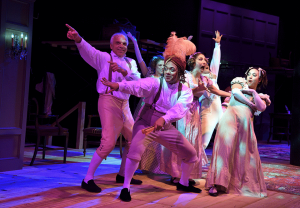 One day in high school, I sat in an assembly where some earnest actors tried to show us how “edgy” Shakespeare was. I remember thinking the whole thing was pointless, since by then, we all knew that Shakespeare was filled with sex, violence and murder. The REAL challenge – or so I thought – would be to find a way to get us to enjoy the more delicate and slower-moving prose of authors like Emily Bronte and Jane Austen.
One day in high school, I sat in an assembly where some earnest actors tried to show us how “edgy” Shakespeare was. I remember thinking the whole thing was pointless, since by then, we all knew that Shakespeare was filled with sex, violence and murder. The REAL challenge – or so I thought – would be to find a way to get us to enjoy the more delicate and slower-moving prose of authors like Emily Bronte and Jane Austen.
However, after seeing Kate Hamill’s delightful new adaptation of Austen’s Pride and Prejudice at Trinity Rep, it seems I was wrong.
Pride and Prejudice tells the story of the Bennet family, as the matriarch (Janice Duclos) attempts to find suitable (read: wealthy) husbands for her daughters Lizzy (Rebecca Gibel) and Jane (Shelley Fort), before their father (Richard Donelly) passes on and they lose their house. Along the way, the proceedings are complicated by misunderstandings, hesitancy and the societal expectations of the times.
On the surface, there wouldn’t seem to be much meat for a lively stage adaptation (especially from the point-of-view of a bored high-schooler in English class). However, from the moment the lights went up, this production drew the audience in, and never let us go.
What struck me the most was how incredibly funny it was. The dialogue honestly and sincerely relayed the plot, while still finding ways to wink at the audience and allow us to share in the absurdity (and, at times, overtly repressed sexuality) of the mores of the time. One particular highlight occurs in Act 1, where Lizzy is sharing secrets with one of her several suitors – “I want to lay myself bare to you,” she says to him, and in response, he replies that her candor made him want to “expose myself fully to you.”
Even when there’s no dialogue, the play still finds ways to have fun and provide contextual clues. A formal ball is a major set piece in the story, and while these might be stuffy, dull affairs to us, they were quite obviously the dance club/meat market of the time. To illustrate this, the actors strut and twerk to Madonna and C+C Music Factory during scene transitions, only to shift instantaneously back into the story once the play resumes.
Exchanges and moments like this are peppered liberally throughout the show, creating a festive atmosphere that stayed with us long after the final bows were taken.
However, while the play is certainly funny and irreverent, it would be a mistake to dismiss it as unserious or without deeper meaning. The fact is, there are lots of things happening underneath the surface to reward those who are paying attention.
For example, Pride and Prejudice has a fascinating relationship with gender and identity. Some of the performers play one role throughout, while others play several. Some only play their own gender, some switch genders when they switch roles, and one performer even plays two separate parts of the opposite sex. Finally, some of the performers are allowed to embrace the comedy of their roles, while others are asked to play it straight. For most of the show, all of this feels like nothing more than fun hilarity as actors change roles and outfits at rapid pace, sometimes between one line and the next. However, at some point, when the characters start opining and agonizing over what it means to be a proper lady or gentleman, you realize that, hidden amidst the wackiness, there is a subtle but powerful message being relayed.
As if to underscore that theme, the story takes a brief but serious turn toward the end of the play, when Lizzie learns of a scandalous act perpetrated by her youngest sister Lydia (Katie Croyle). The story is relayed to her by her sister Mary (Angela Brazil). Up until this point, Ms. Brazil had been the unquestioned comedic highlight of the show, wringing laughs out of every line and mannerism from each of her two roles. However, as she details her sister’s downfall, she quietly and somberly discusses how a single mistake stains a woman’s reputation for life. All at once, this story of strange people from a time long ago felt very modern and resonant.
Technically, Pride and Prejudice is an outright triumph. Set designer Michael McGarty has created a beautiful and utilitarian set that transforms as adeptly as the performers from location to location, as needed. Costume designer Olivera Gajic has likewise added to the beautiful complexity of the show, crafting outfits that are decadently over-the-top for the comedic roles, and tastefully understated for the serious ones. Finally, director Birgitta Victorson has brilliantly woven all these elements together into a production that is a technical marvel, even as it feels lighthearted and effortless.
There is nothing quite as energizing and refreshing as a laugh-filled night out at the theater. If this is your goal, you can trust me (if not your high school English teacher) when I tell you that you simply can’t do better than this one.
Pride and Prejudice runs through Nov 4 at Trinity Rep, 201 Washington St, PVD. trinityrep.com; 401-351-4242